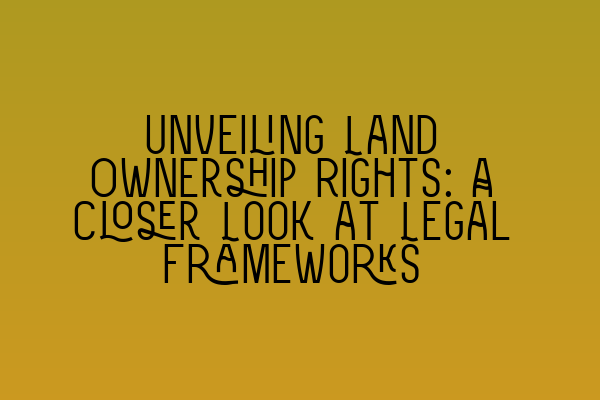Unveiling Land Ownership Rights: A Closer Look at Legal Frameworks
When it comes to land ownership, understanding the legal frameworks is crucial. Whether you are an individual buying a property or a business considering a land development project, having a comprehensive understanding of land ownership rights is essential to safeguard your interests and ensure a smooth transaction.
In this article, we will delve deeper into the legal aspects of land ownership, exploring the various frameworks that govern land rights and discussing their implications. By gaining a clearer understanding of these legal frameworks, you will be better equipped to navigate the complexities of land ownership and protect your rights.
The Foundations of Land Ownership
Land ownership rights are founded on the principle of property law, which recognizes an individual’s or entity’s exclusive control over a parcel of land. However, it’s important to note that land ownership is not an absolute or unlimited right but is subject to certain legal limitations and regulations.
The legal frameworks that govern land ownership can vary depending on the jurisdiction, but common principles often include:
- Fee Simple: This is the highest form of land ownership, granting the owner complete and indefinite control over the property. It allows the owner to use, sell, or transfer the land as they see fit, subject only to legal limitations such as zoning restrictions or environmental regulations.
- Leasehold: In a leasehold arrangement, an individual or entity holds the right to use and occupy the land for a specified period of time. The leaseholder pays rent to the landowner and enjoys certain rights and privileges, but the ultimate ownership remains with the landowner.
- Commonhold: Commonhold is a relatively new form of land ownership that allows multiple individuals to own separate units within a shared building or development. Each owner holds a freehold interest in their individual unit and shares the ownership and management of common areas with other co-owners.
These are just a few examples of the legal frameworks that exist within property law. Each framework carries its own rights and responsibilities, and it’s important to obtain expert legal advice to ensure a thorough understanding of the implications of each.
Registration and Protection of Land Ownership Rights
In many jurisdictions, land ownership rights are registered and protected through a system of land registration. This process involves recording the details of land ownership in a public register, providing clarity and certainty for buyers and sellers.
The registration of land ownership serves several purposes, including:
- Establishing proof of ownership: Registering land ownership provides a clear legal record that can be relied upon to establish proof of ownership.
- Preventing fraud: The registration system helps protect against fraudulent claims of ownership or unauthorized transfers of land.
- Encouraging transparency: Public access to land registers promotes transparency and helps individuals and businesses make informed decisions when engaging in land transactions.
It’s worth noting that the process and requirements for land registration can vary between jurisdictions. Therefore, it is advisable to seek expert advice from a property law solicitor who is familiar with the specific regulations and practices in your area.
Resolving disputes and protecting land ownership rights
Despite the existence of legal frameworks and land registration systems, disputes can still arise concerning land ownership rights. These disputes can stem from various issues, such as conflicting claims of ownership, boundary disputes, or breaches of contractual agreements.
In such cases, seeking legal assistance from a property law solicitor is crucial to protect your interests and resolve the dispute in a timely and efficient manner. Property law solicitors specialize in navigating the complexities of land ownership and can provide expert advice on the applicable laws, legal strategies, and potential remedies available.
Additionally, obtaining title insurance can provide an extra layer of protection for land ownership rights. Title insurance offers coverage in the event of unexpected ownership claims, errors or omissions in public records, or undisclosed liens or encumbrances on the property.
To sum up, understanding the legal frameworks that govern land ownership is vital for anyone involved in land transactions. By gaining a comprehensive understanding of these frameworks, seeking expert legal advice, and taking necessary precautions such as land registration and title insurance, you can protect your interests and ensure a smooth and secure land ownership experience.
In the world of property law, SQE Property Law & Land Law has a team of dedicated professionals who specialize in providing expert legal advice and representation. They handle all aspects of property law, offering comprehensive services to individuals and businesses alike.
For more information on related topics, you can explore the following articles:
- Understanding Contractual Capacity: Rights and Limitations
- Interactive SQE Mock Tests for Contract Law: Test Your Knowledge
- Join Our SQE Contract Law Webinars: Expert Insights and Guidance
- SQE Prep: Mastering the Essentials of Contract Law
- Contractual Capacity: Understanding Legal Competence in Contracting Parties
